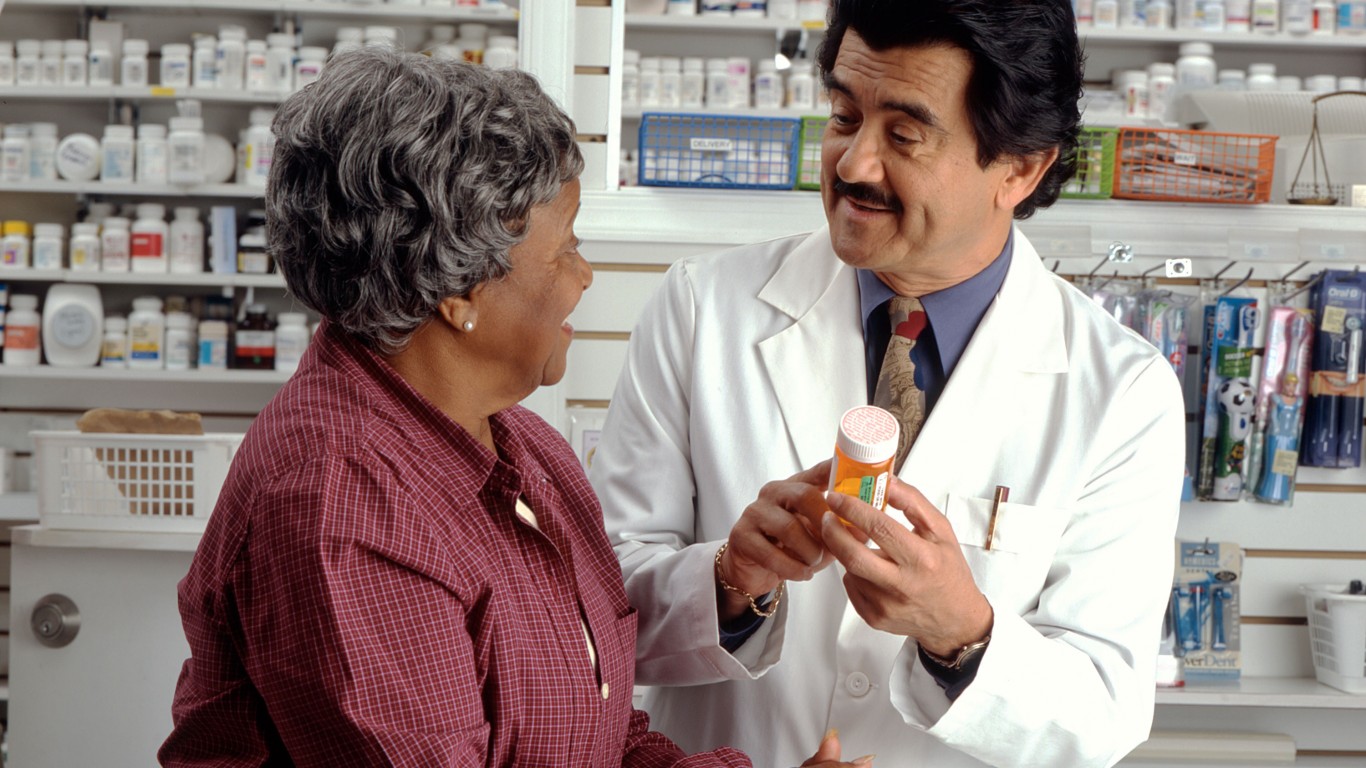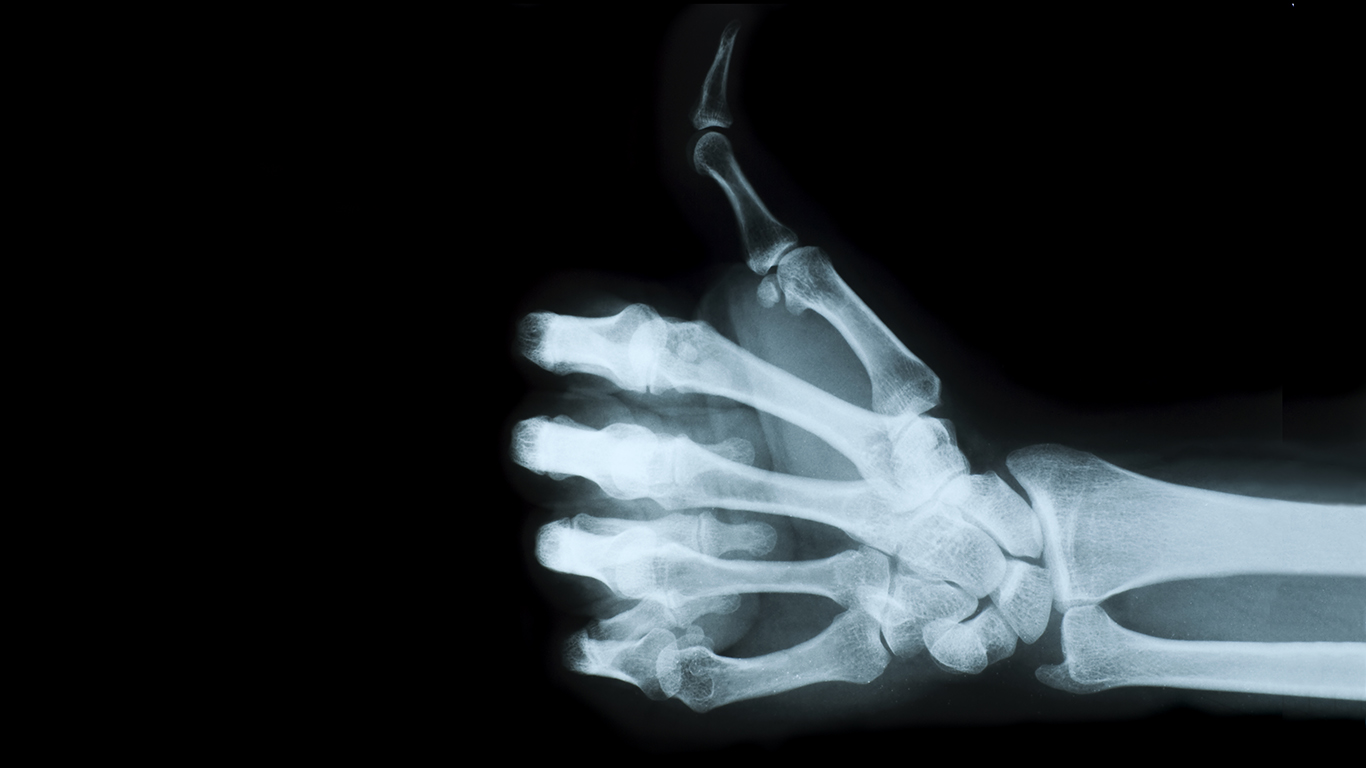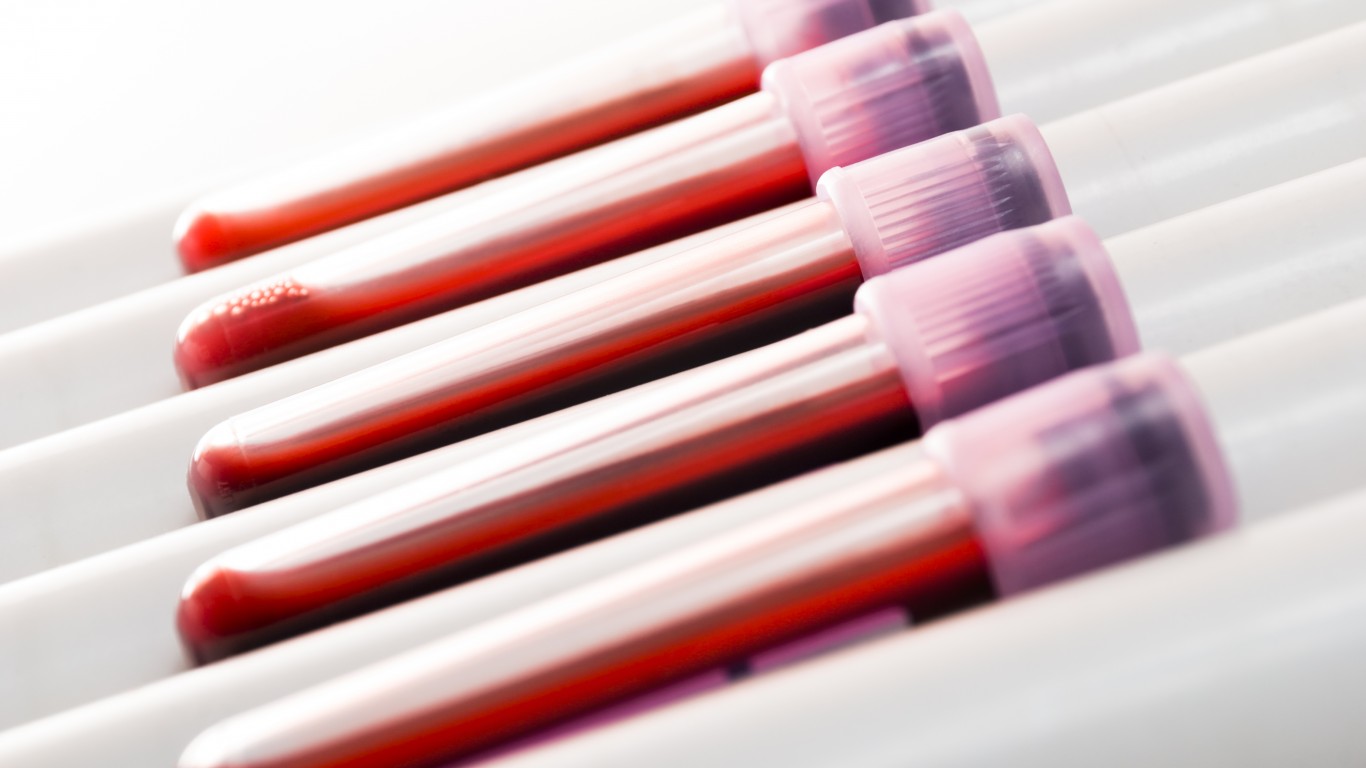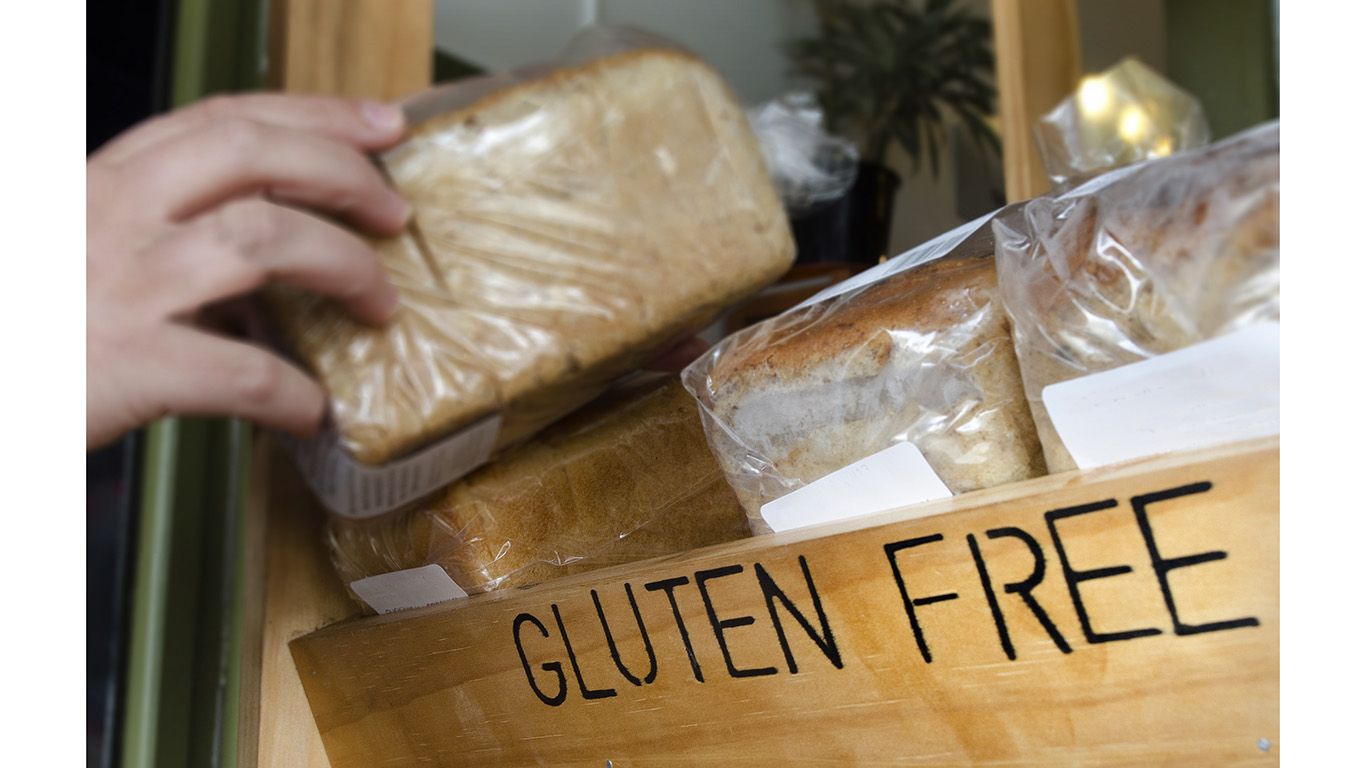
Navigating the realm of healthy and unhealthy foods and beverages can be both daunting and exhausting. The influx of information often clouds our ability to discern the nutritional value of the treats we consume. However, several key ingredients can universally render any food or drink unhealthy. These culprits include excessive sugar, sodium, trans fats, and certain oils.
These components frequently lurk within products, hiding in plain sight. You have to know how to decipher labels and comprehend the intricacies of ingredient names.
To compile a comprehensive list of foods and beverages that are commonly misconceived as healthy, 24/7 Tempo sought the expertise of multiple nutritionists.
“When it comes to ingredients, my top two no-no’s are monosodium glutamate (MSG) and high-fructose corn syrup,” said Gabriela Rivera, a nutritionist practicing with clinical nutritionist Kay Spears in San Antonio, Texas. MSG is the sodium salt of glutamic acid. “Glutamic acid actually stimulates the brain,” she explained. “Therefore, some individuals might experience headaches or even muscle cramping” from consuming it.” As for high-fructose corn syrup, an artificial sweetener processed from corn syrup, she said. “It has been linked to obesity and can even cause insulin resistance when consumed in excess.”
Another big misconception about food is its purpose, Rivera said. “A lot of our clientele think that food needs to be enjoyable and taste good.” There is nothing wrong with that but food is actually fuel for our bodies. The types of foods we eat can change both our physical and mental health, she noted, quoting Hippocrates who said: “Let food be thy medicine and medicine be thy food.” (This is what people should know about calories, nutrition, and energy balance.)
Click here to read about foods and drinks you only think are healthy
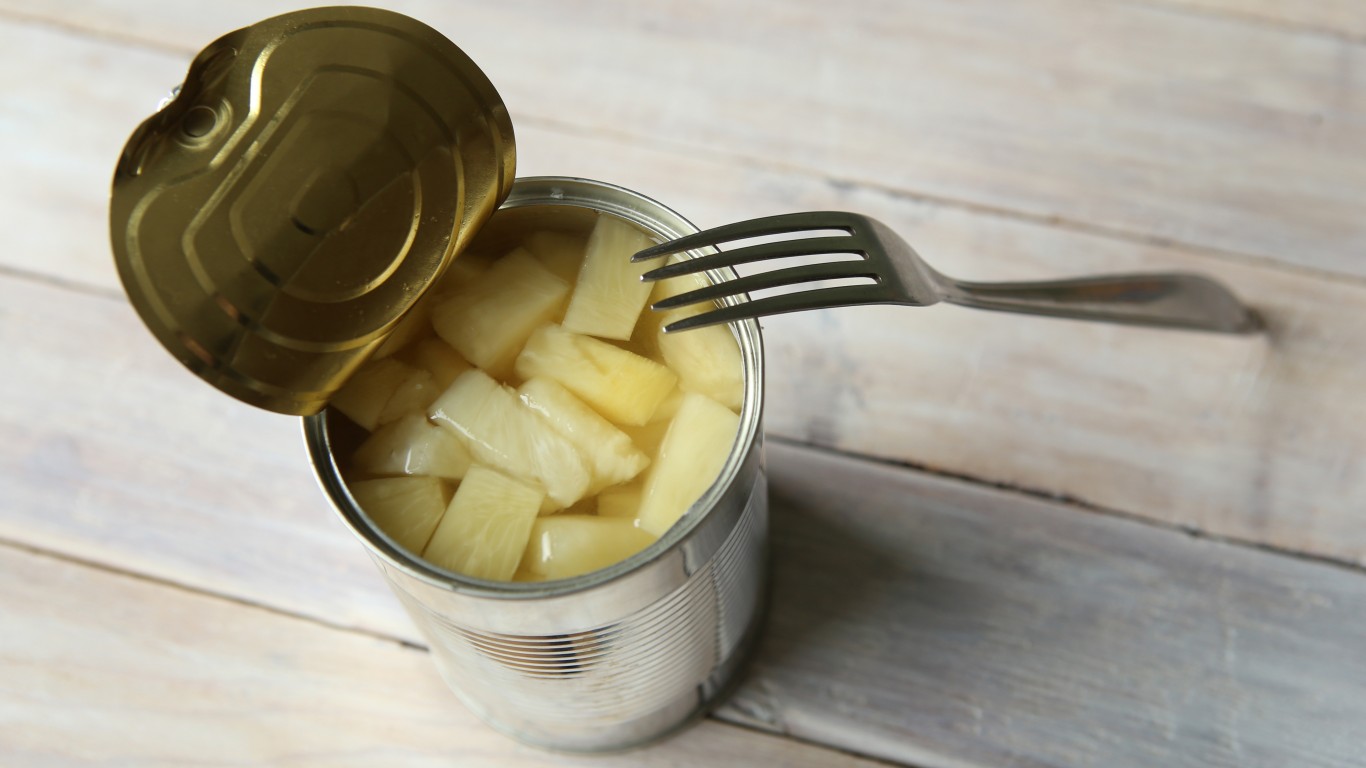
1. Fruit canned in syrup
Eating fruit is great for your health but when you shop for canned fruit, be watchful about what you buy, said Amy Gorin, MS, RDN, owner of Amy Gorin Nutrition in the New York City area. “If a fruit is canned in ‘light syrup’ or ‘heavy syrup,’ sugar has been added to the fruit.” Because fruit is plenty sweet on its own, you don’t need any added sugar with it, she explained. Read the ingredient label to make sure it contains nothing but fruit. “Fruit canned in 100% juice or water is your best bet,” Gorin added.
[in-text-ad]
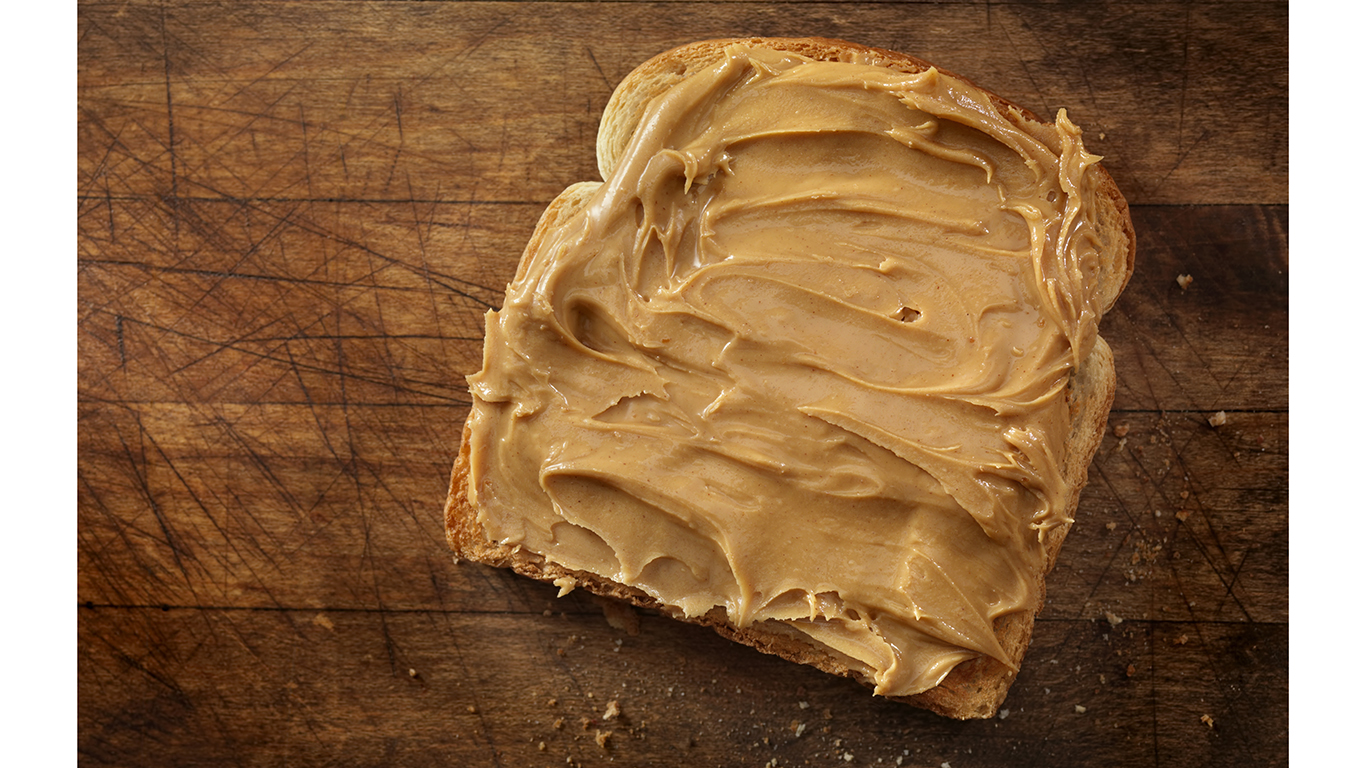
2. Low-fat peanut butter
The healthy fats in nuts and nut butter — specifically the nut butters that don’t have added sugar or fillers — can benefit your health. “Make sure to read the label when you’re buying peanut butter,” Gorin said. At the same time, she warned against buying low-fat peanut butter. “When fat is removed, extra sugar and filler ingredients are added,” she said.
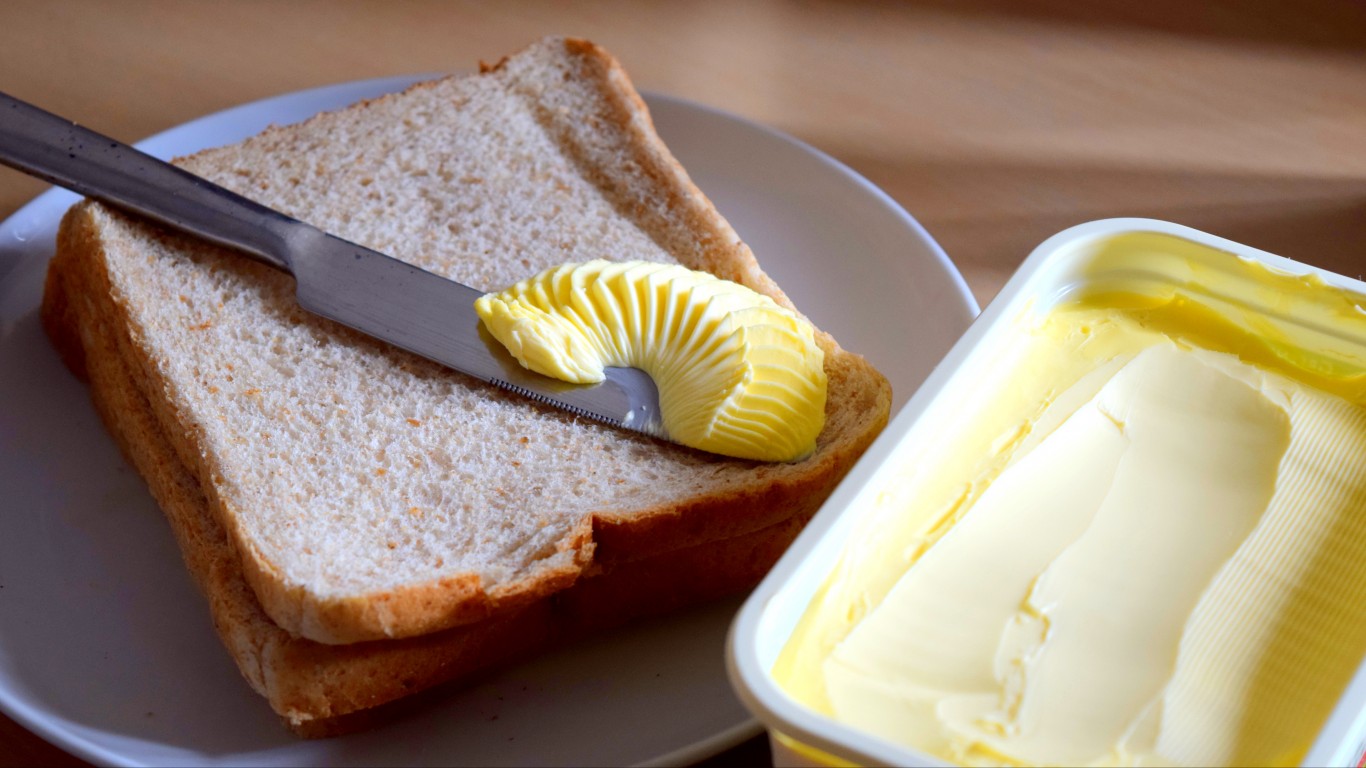
3. Margarine
You might think that margarine is a healthy alternative to butter but many versions out there contain trans fat in the form of partially hydrogenated oil. Trans fats can raise your “bad” LDL cholesterol, lower good-for-you HDL cholesterol, and heighten your risk of heart disease, Gorin noted. “Instead of margarine, try using a small amount of a heart-healthy oil, such as extra-virgin olive oil or grapeseed oil.”
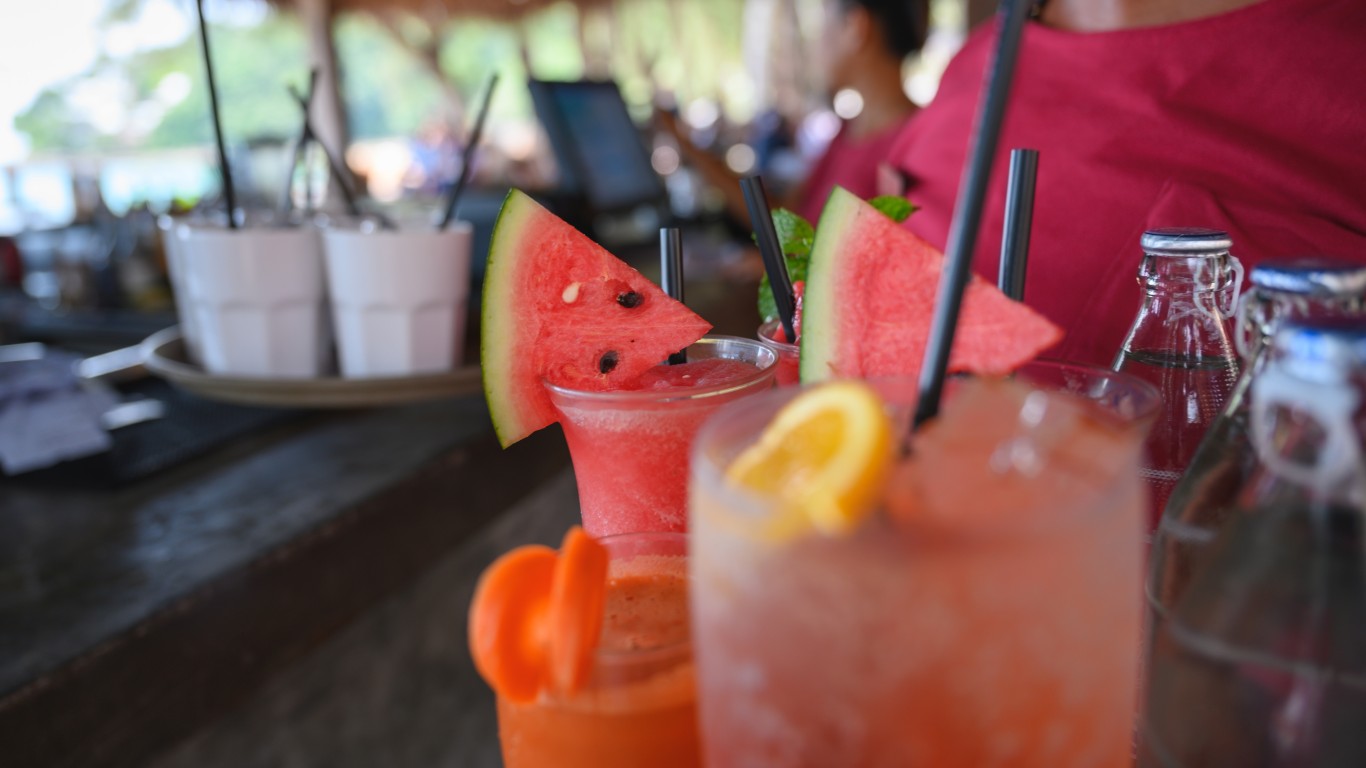
4. Juice cocktail
“This beverage can fool you,” Gorin said. When you’re reaching for juice, opt for 100% juice. Why? “The word ‘cocktail’ indicates that a juice is mixed with added sugar, which is unnecessary and adds extra calories to your day,” she added. As is the case with most drinks, some juices are better than others. And people at risk of heart disease may want to stock up in this kind.
[in-text-ad-2]
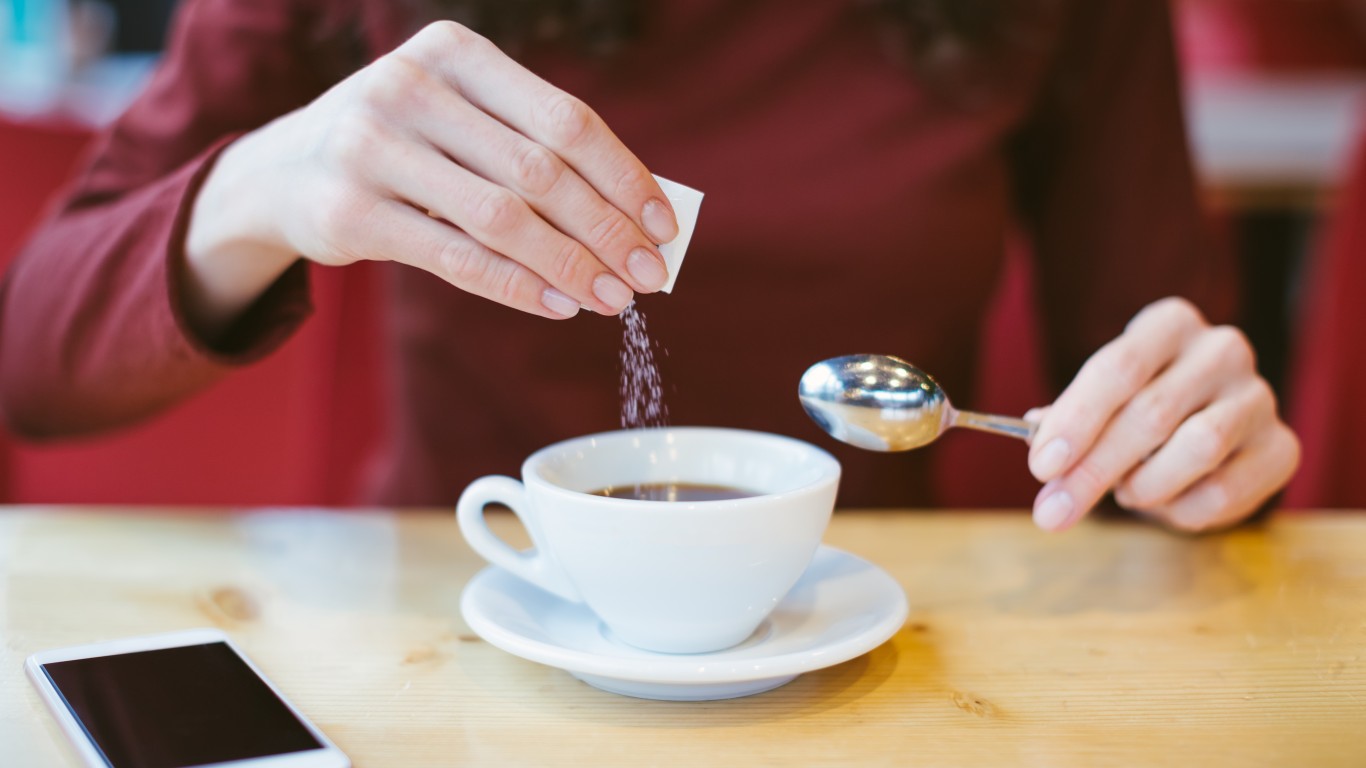
5. Sugar-free products
These are full of artificial sweeteners, Rivera said. “Sometimes artificial sweeteners can help reduce sugar consumption and may be lower in calories,” she added. She also noted that for some weight-loss clients, sugar-free products might be trigger foods and set off binge eating. When trying to lose weight or just be overall healthy it is best to stick with whole and less processed foods, she noted. And don’t even think diet soda is healthier: These are at least 10 ways drinking diet soda could be killing you.
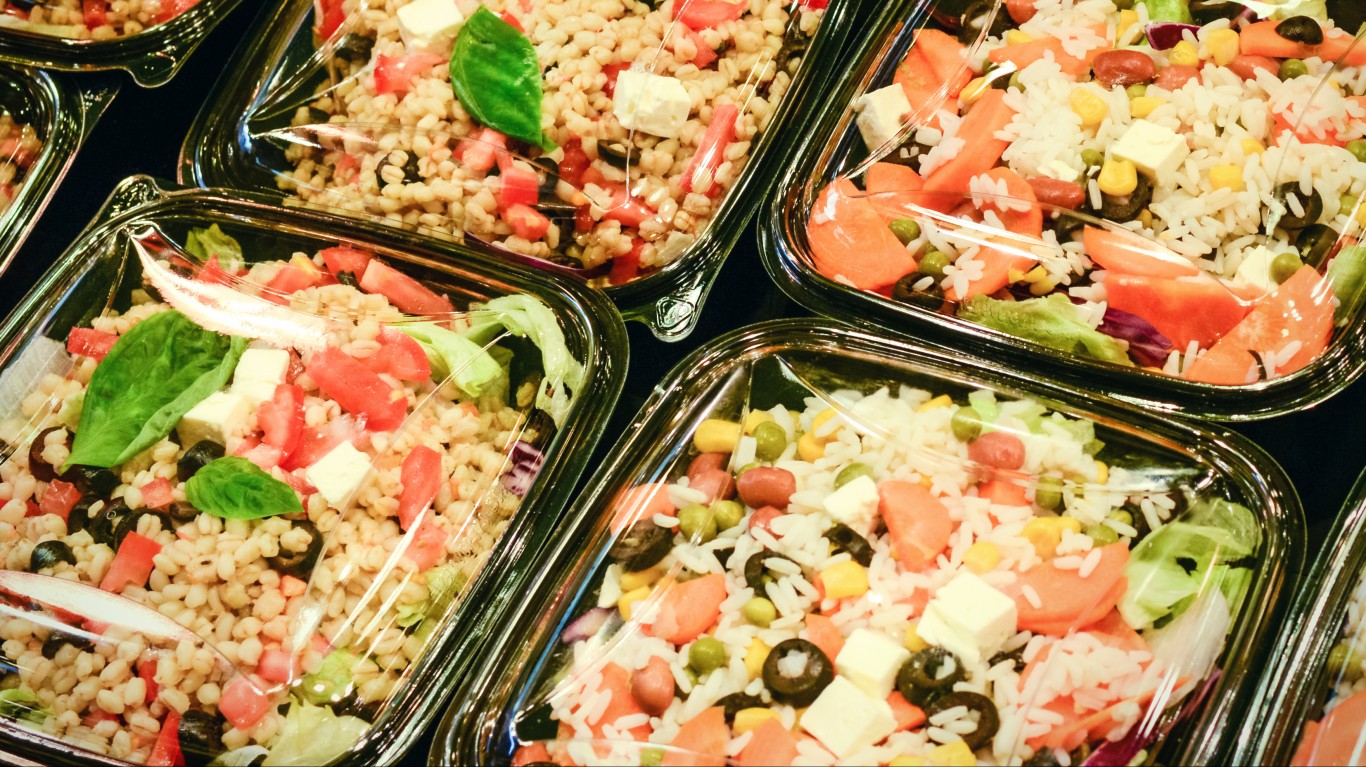
6. Store-bought pre-packaged salads
“I would say pre-packaged salad are a last resort,” Rivera said. If they have deli meat included, I would recommend to double check the expiration dates and to try to limit the salad dressings, which are usually packed with calories, she noted. Pre-packaged salads are also a sanitary concern. Bacteria and fecal contamination are not uncommon, according to Consumer Reports. Poor sanitation has resulted in some of the worst food recalls of all time.
[in-text-ad]
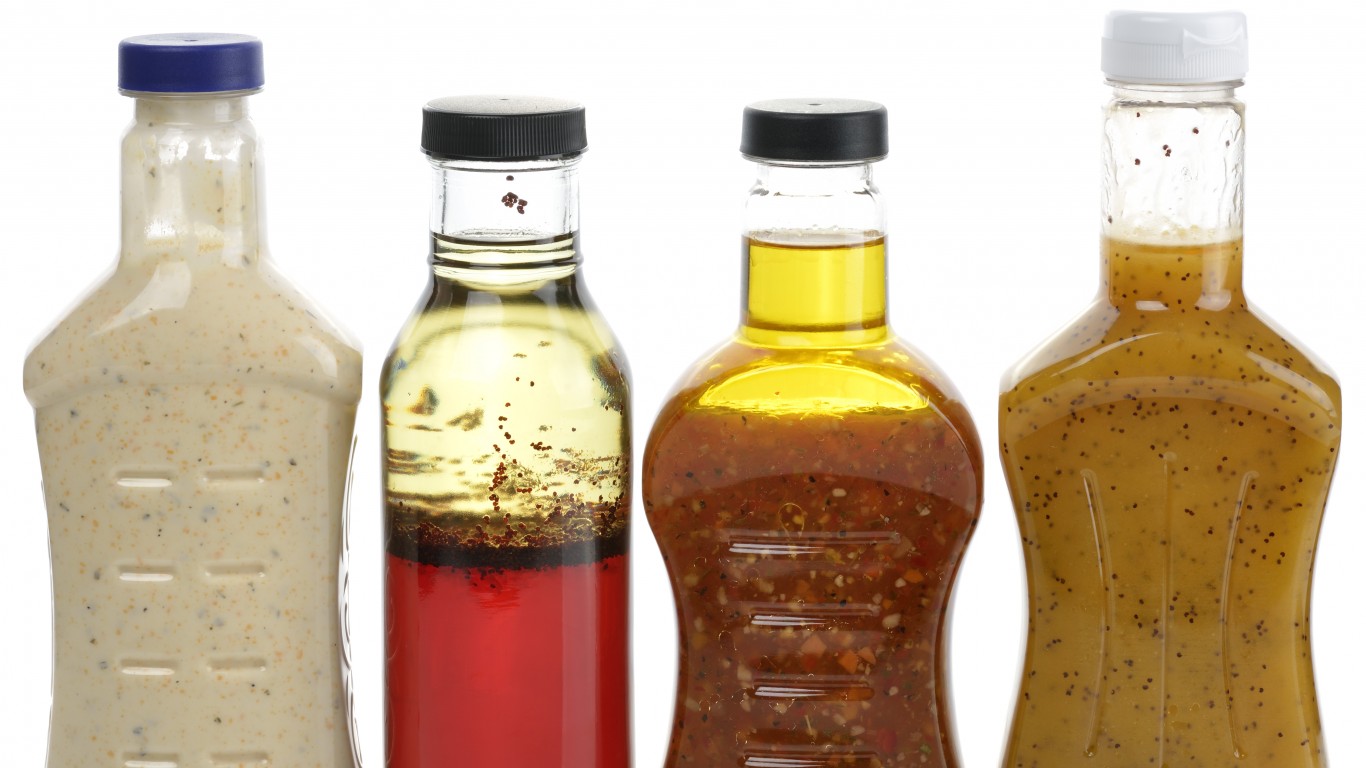
7. Salad dressings
Sometimes, in terms of calorie intake, eating a salad with certain dressings it’s equivalent to eating a cheeseburger and fries, Jill Maher, a nutrition health coach in Scottsdale, Arizona. Many commercial dressings contain corn syrup, which offsets other possible healthy ingredients in the salad, she noted. Many of these dressings are also packed with artificial flavors and colors and sodium-rich preservatives.
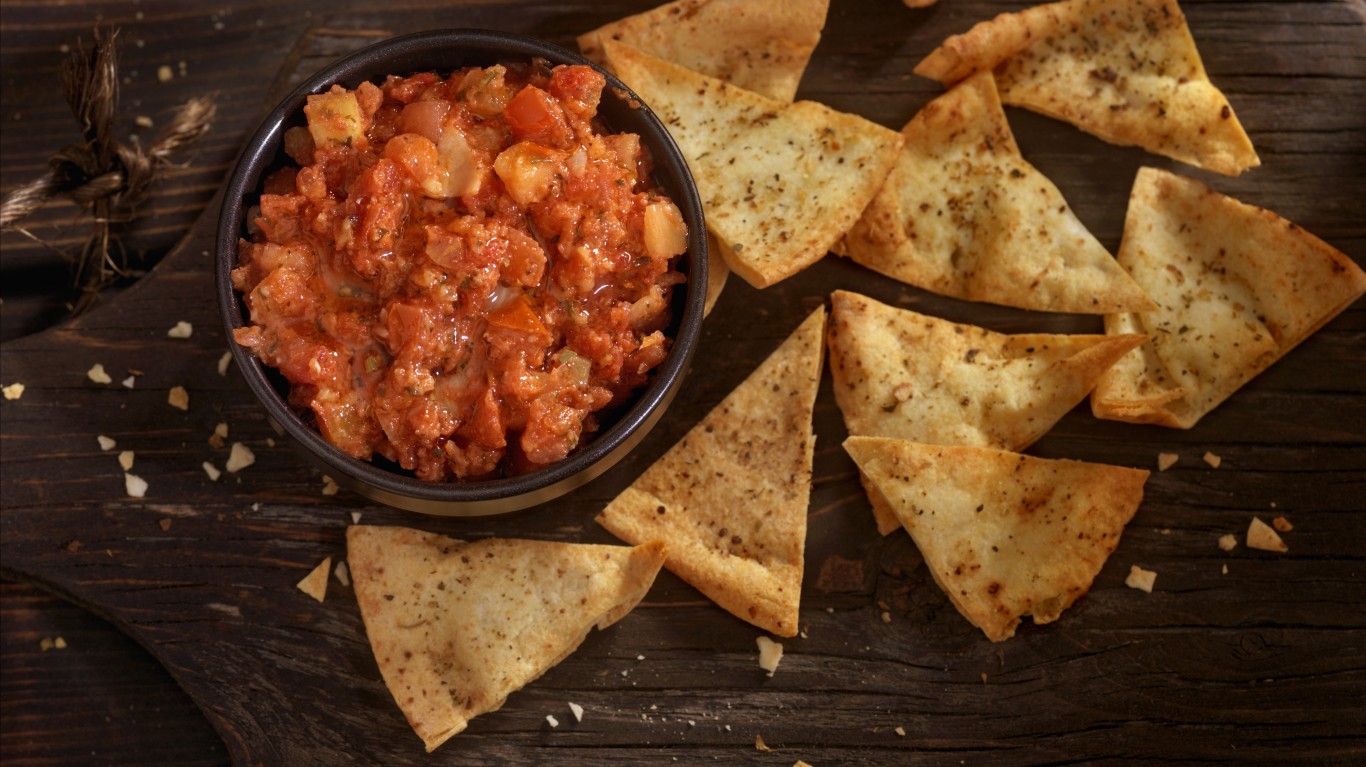
8. Pita chips
“I don’t usually recommend pita chips to my weight loss clients,” Rivera said. The problem is that it’s all too easy to eat a lot of them, packing in the calories. “They are also highly processed and usually high sodium,” she said. It’s probably better to steer clear or choose the baked kind, as the fried ones are usually fried in partially hydrogenated oil (read trans fats), which have been linked to an increased risk of heart problems and diabetes. (These are 10 warning signs you might have diabetes.)
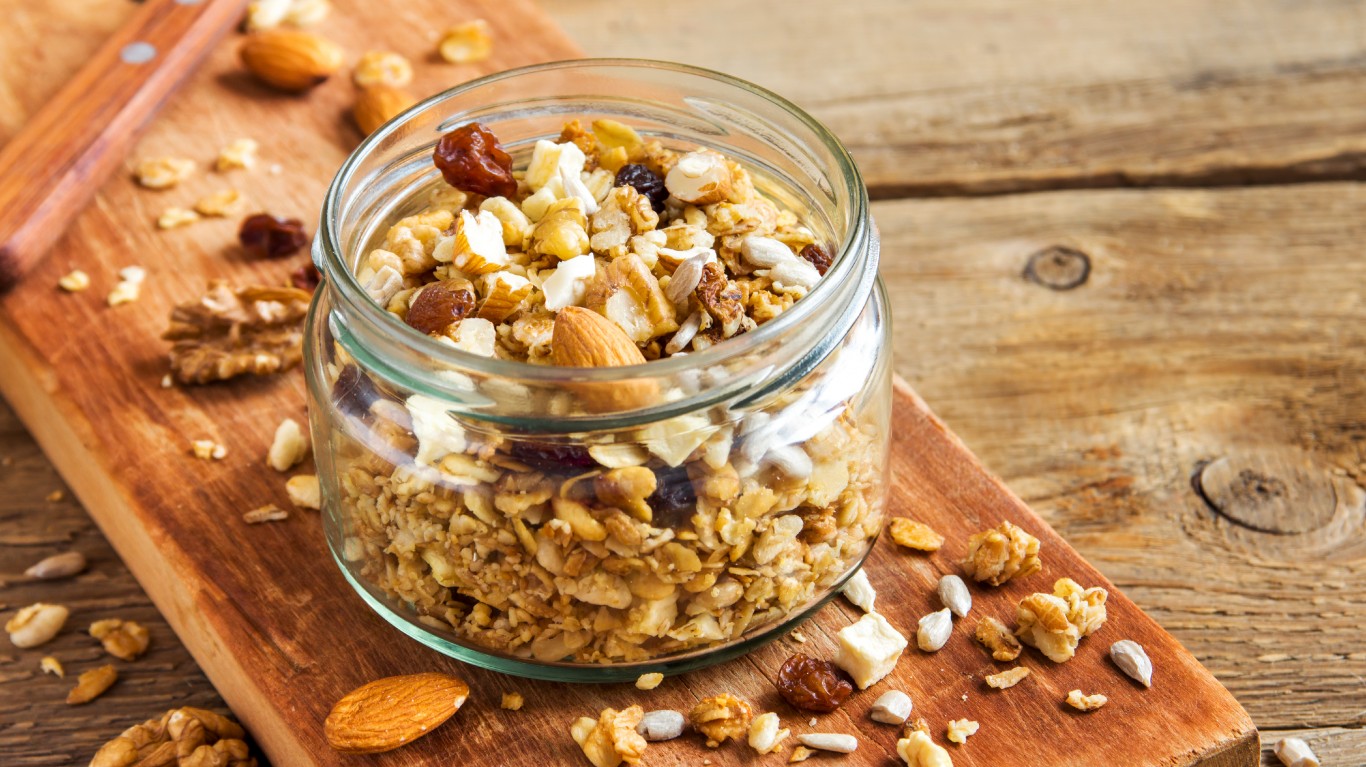
9. Granola bars
Physically active people love these quick snacks. They have even been marketed as meal replacements. They can be healthy, but that depends on their ingredients. Many commercial versions are high in calories, and depending on the brand, can contain the wrong oils (such as hydrogenated oil), according to San Antonio clinical nutritionist Sarah Treat. Granola bars contain nuts, which have healthy fats, but many also have added oils, as well as sugars in the form of honey, sweetened chocolate, and different kinds of syrup.
[in-text-ad-2]
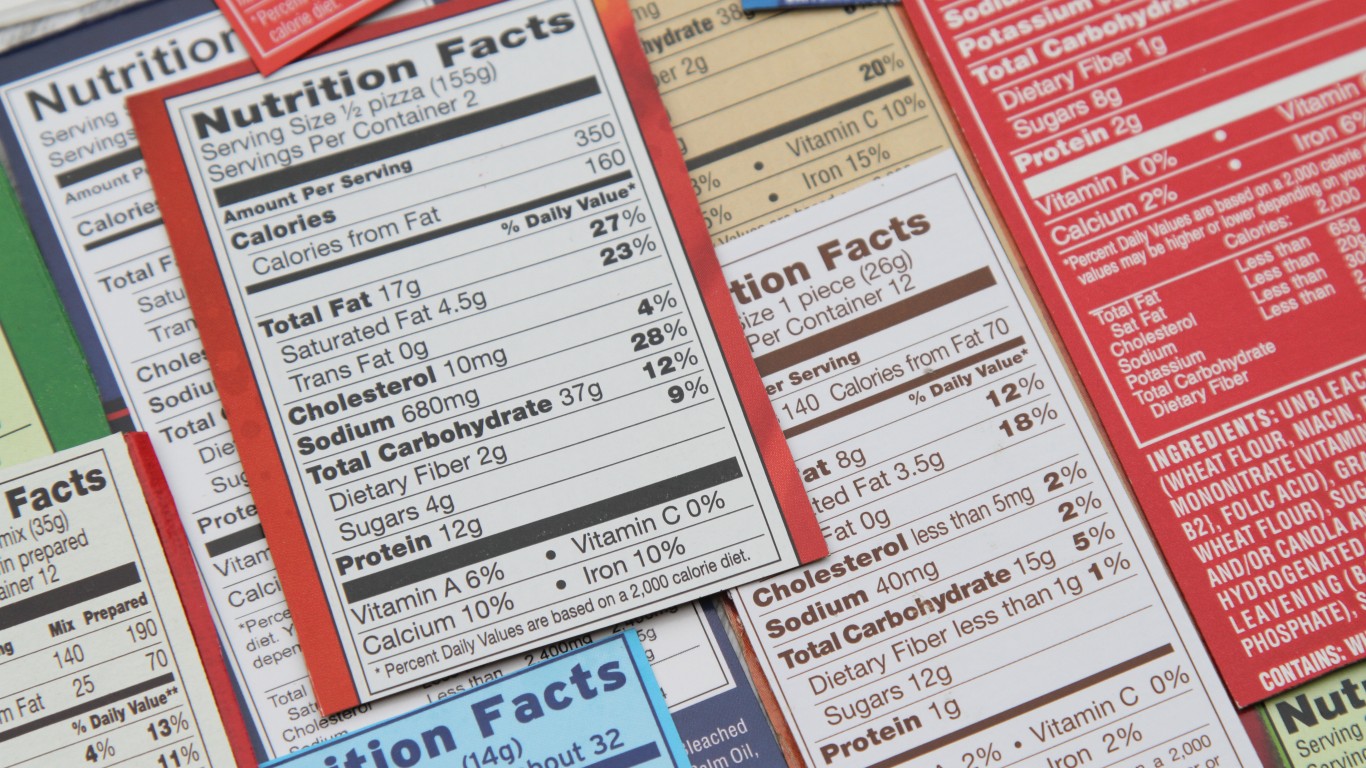
10. Low-fat and non-fat products
It sounds appealing. Fat is usually a bad word and nobody wants to consume a lot of it. Many companies process their products to remove the fat, but the problem is that much of the flavor is lost, too — so they make them taste better by filling them with artificial sweeteners or sugar, Maher said. Flour and other thickeners, which can add calories, are often added as well. Read the labels. If you see a lot of sugar and additives, put the product down and walk away.
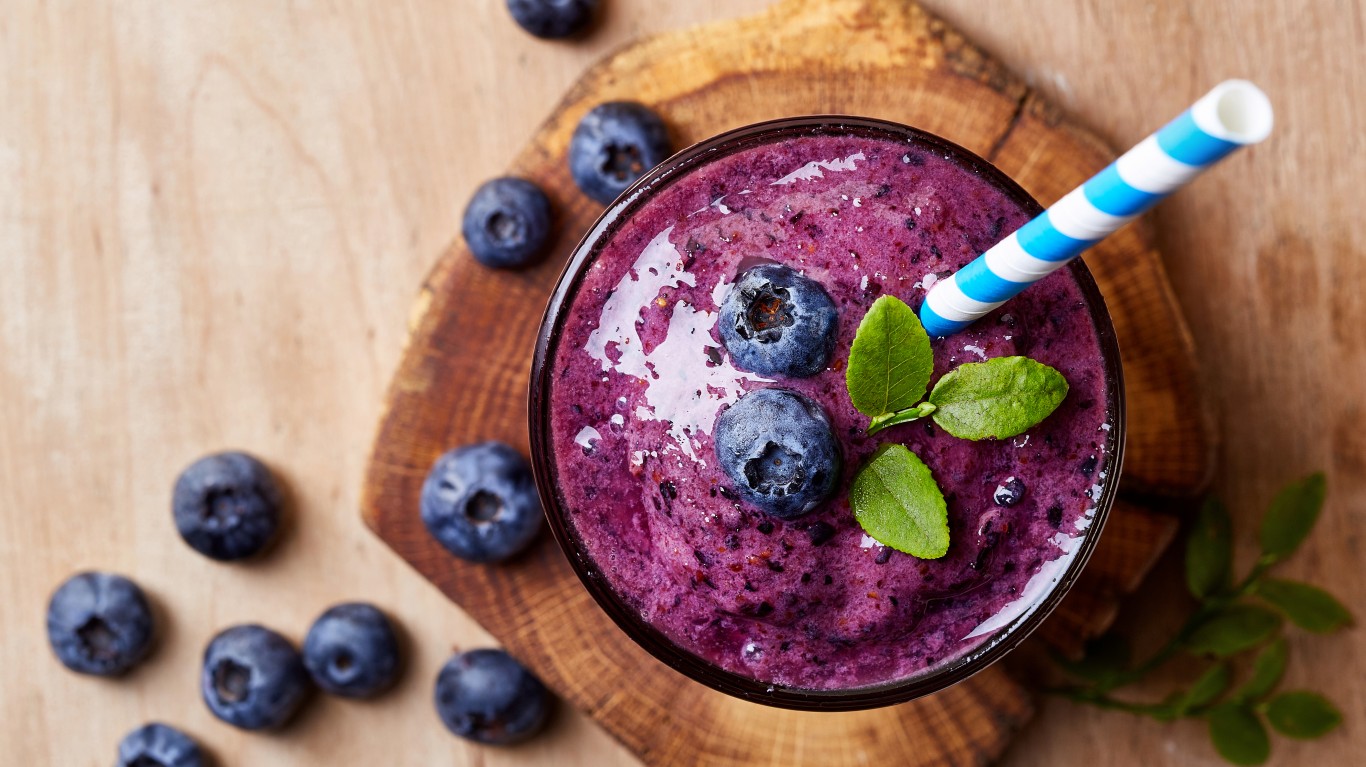
11. Fruit-only smoothies
They are “horrible,” Treat said. “Way too much fruit at once.” You have to add some vegetables for better nutritional value, Maher added. “Get some protein, too,” she noted. Striking a balance between vegetables, fruits, protein, and fat is key to making the smoothie a healthy one, she explained. A good rule of thumb is to keep it simple — vegetables and fruits, some milk or yogurt for protein, and certainly no ice cream.
[in-text-ad]
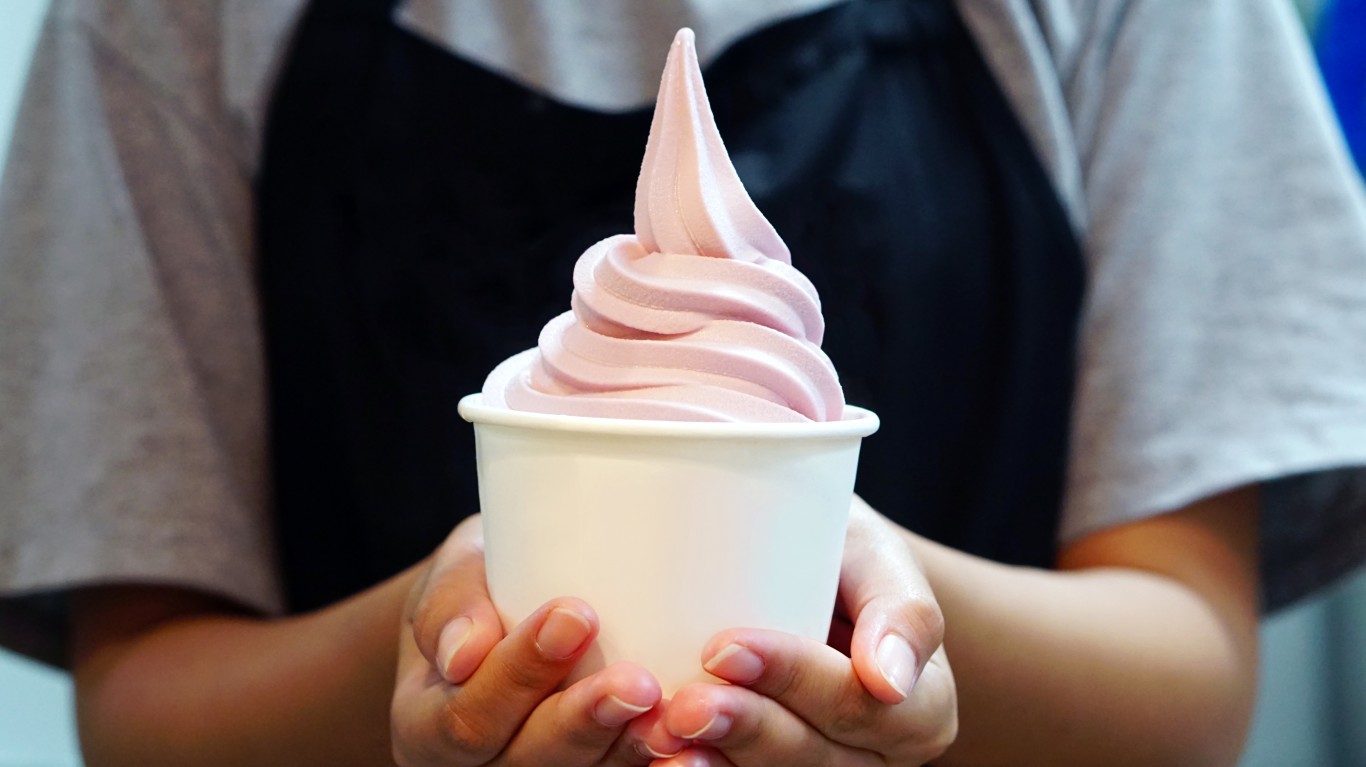
12. Frozen yogurt
A 2015 survey showed that 95% of Americans think frozen yogurt is healthier than ice cream, but they may be wrong. It is actually an empty-calorie treat that’s high in sugar, Treat said. Also, the freezing process may destroy the probiotics, or good gut bacteria, yogurt is known for — though some may be added back after processing. (These are some of the best foods for your gut health in general.) Frozen yogurt may also actually be slightly higher in sugar content than the equivalent ice cream.
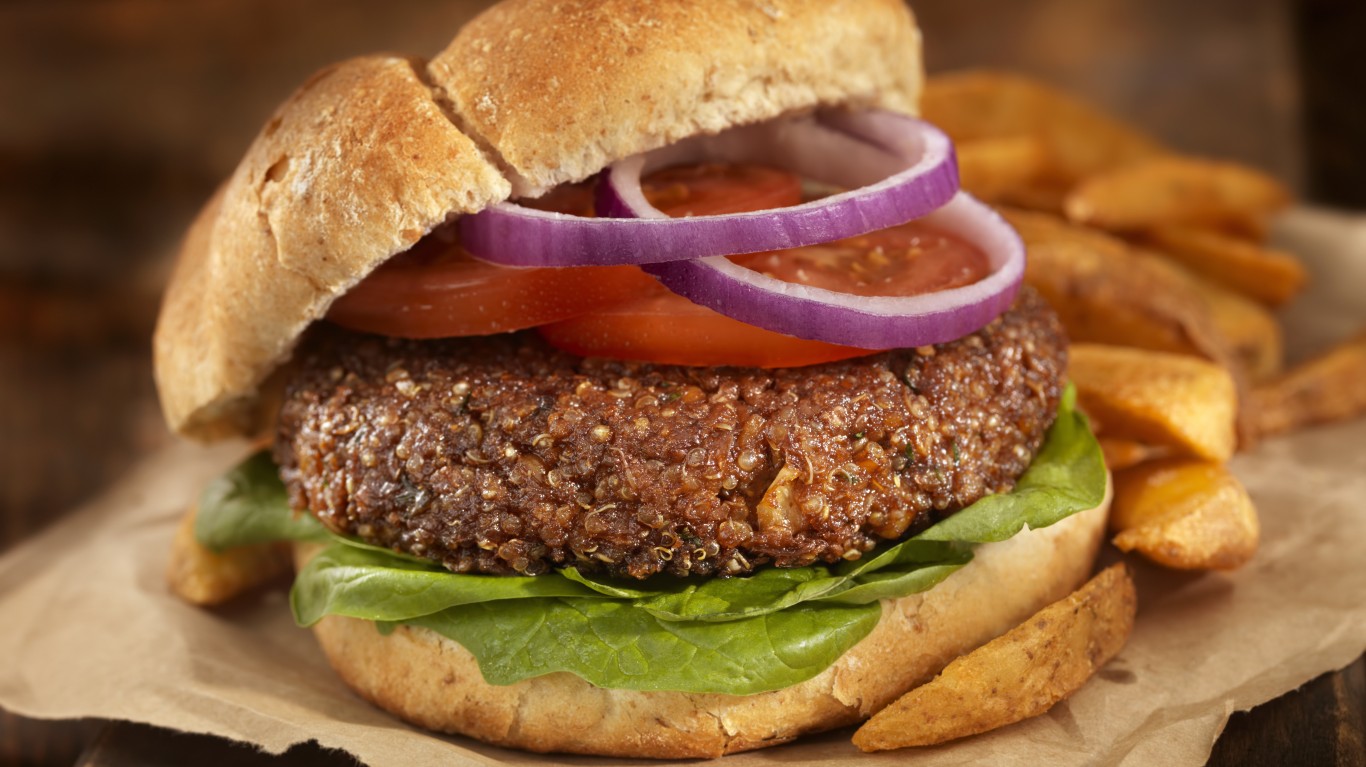
13. Veggie burgers
These may not be red meat, but they rarely contain green vegetables, either. According to Maher, “They are usually made of starch — beans and other grains.” The protein content in veggies burgers can vary greatly, too. In some, the protein source is actually soy protein isolate, which is basically dry soybeans without the sugar and fiber. Veggie burgers are also typically packed with sodium — as much as 500 mg per serving, according to Consumer Reports. One patty should contain no more than 350 mg.
14. Bottled iced tea
Some 75% to 80% of all tea consumed in this country is iced tea, and Americans consumed about 1.8 billion gallons of the ready-to-drink version in 2018, according to Consumer Reports. But some brands contain as much sugar, artificial color, and flavorings as soda, Maher said.
[in-text-ad-2]
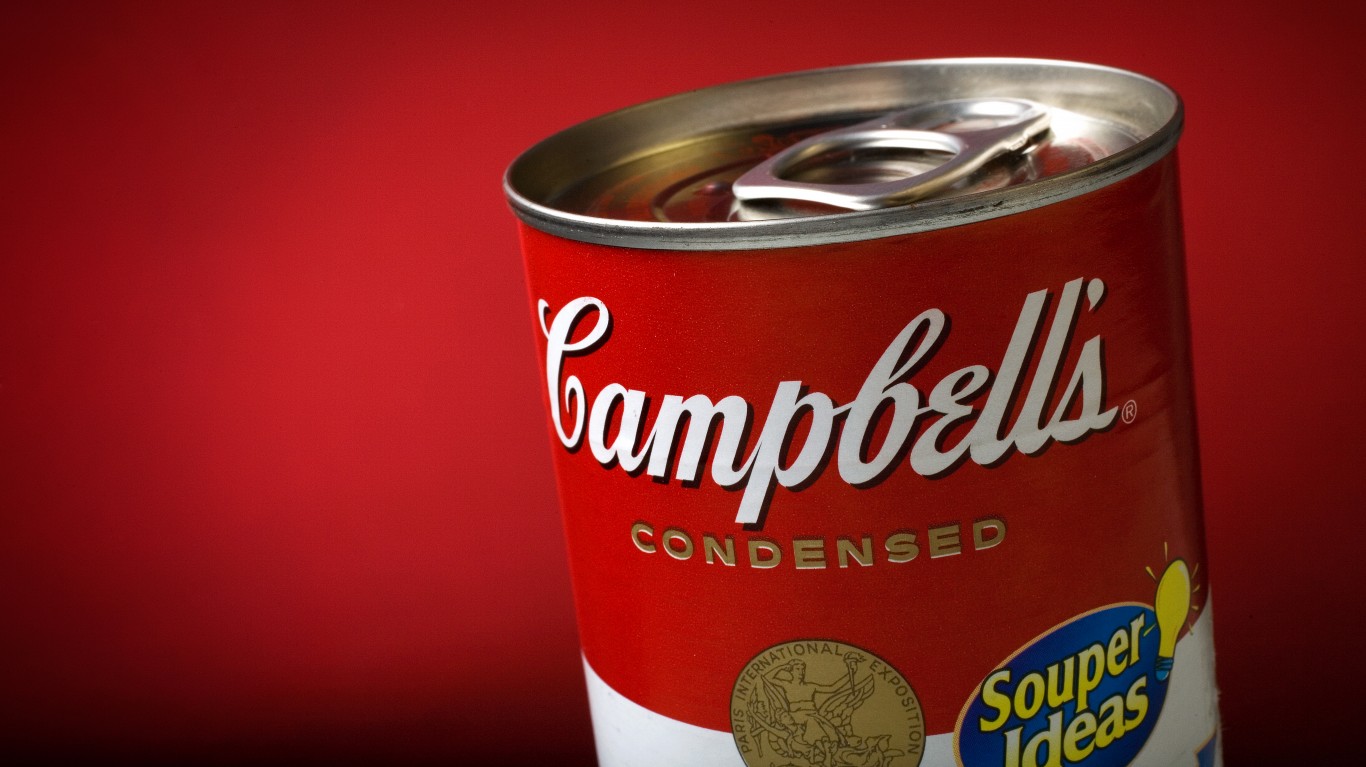
15. Canned soups
To begin with, said Maher, choose cans that aren’t made with bisphenol-A (BPA), an industrial chemical that has been linked to birth defects, some cancers, and obesity. Many brands still uses the substance in their packaging. Also, choose salt-free or reduced sodium soups whenever possible. Most of the sodium Americans consume comes from processed foods, canned soups included, according to the CDC. In addition, noted Maher, canned foods normally have a lot of added preservatives, and that makes them less nutritious than homemade soups. These are the top-selling canned foods in America.
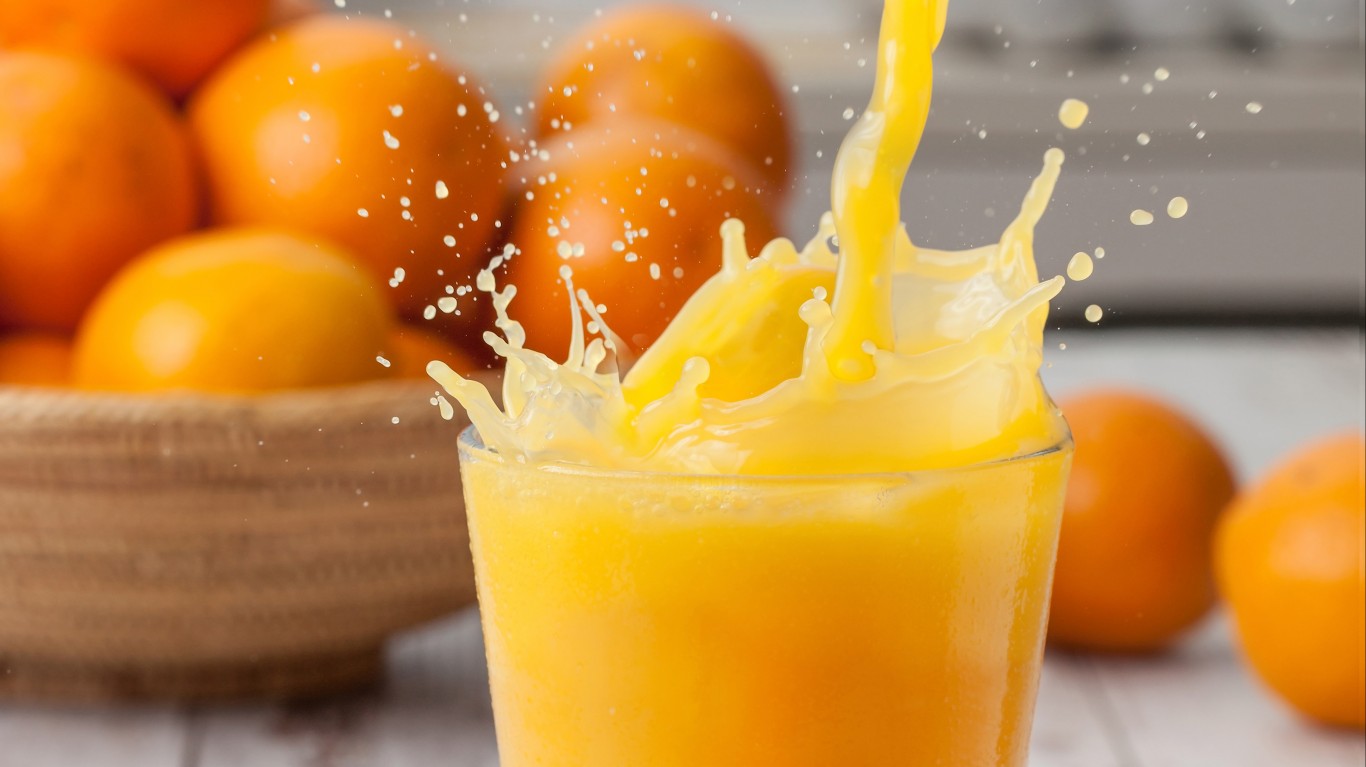
16. Fruit juices
“People don’t realize the amount of sugar juices have,” said Donovan Maycock, a nutritionist at Perfect Solutions, a nutrition and weight loss center in San Antonio. “The body was designed to eat an orange, not to drink five oranges.” A lot of the fruit’s healthy nutrients have been lost during when an orange is processed into juice and have been replaced by sugar, he noted, so in a way you’re drinking liquid candy. In addition, juices don’t have the same levels fruit does of fiber, which can reduce blood pressure and inflammation and help control blood sugar levels, or phytonutrients, natural compounds that can prevent multiple diseases.
[in-text-ad]

17. Gluten-free
Gluten is a family of proteins found in such grains as wheat, rye, and barley, and in the flours made from them. While those with gluten intolerance or celiac disease must avoid these, there isn’t a lot of research as to whether such substitutes as potato or rice flour are better or worse for non-sufferers, Maycock said. But gluten-free flour is still flour, and often a heavily-processed one. “So now you’re adding foods that are even more processed and that may be even more harmful if you don’t have celiac disease,” Maycock added. Another issue is that gluten-free products — one of the biggest food fads of the past 50 years — are not usually fortified with vitamins, so avoiding them may result in nutritional deficiencies. A 2017 study also found that people who don’t have celiac disease are doing a disservice to their bodies because they don’t eat whole grains, which have many heart benefits.
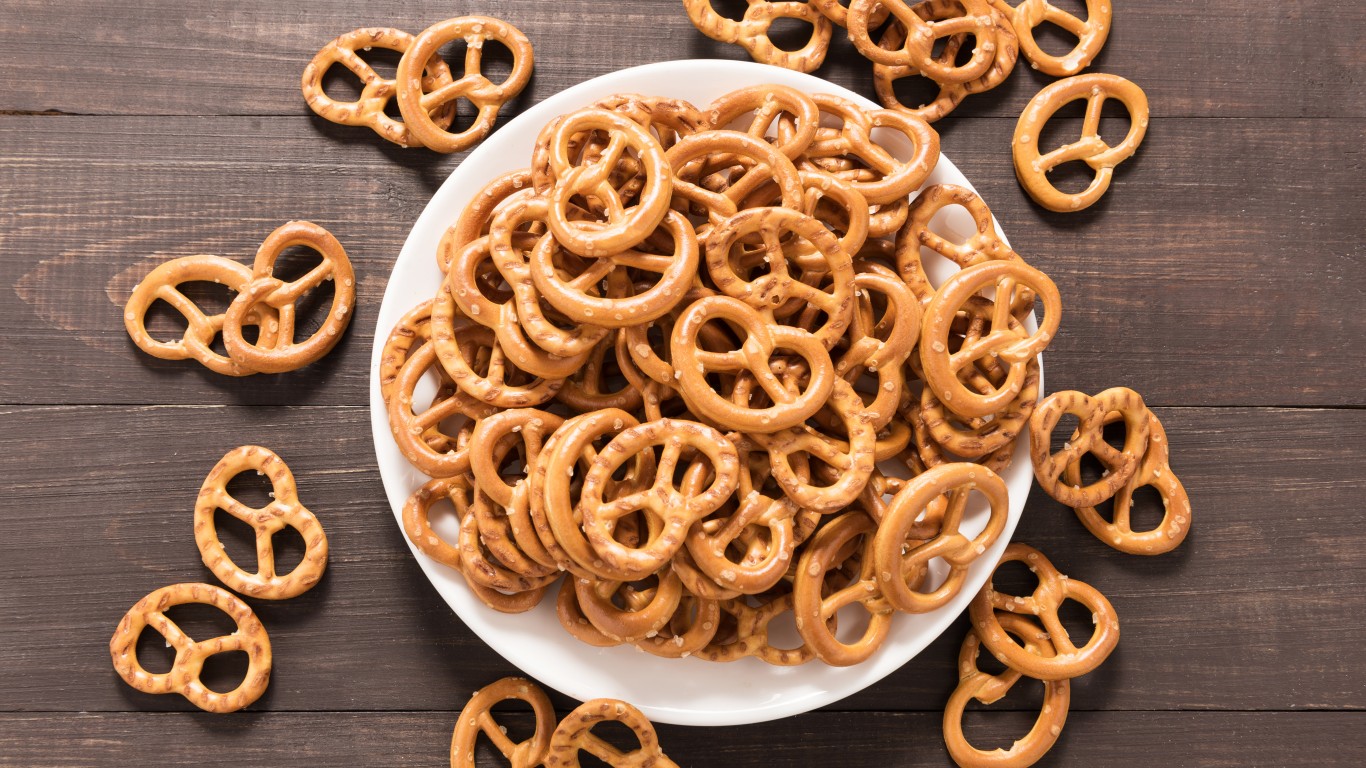
18. Pretzels
Maycock calls them “best of the worst.” They are still heavily processed, but they are better than Doritos, he noted. Pretzels are much smaller, which in a way forces you to exercise portion control, and aren’t made with the artificial dyes that many snack chips contain. They are not as healthy as you think, though, because they lack nutritional value and contain a lot of sodium, which increases the risk of high blood pressure and heart disease. Some brands contain, in just one ounce, 359 mg of salt (the American Heart Association recommends a maximum daily sodium intake of no more than 2,300 mg). High sodium intake is one of several dangerous things experts have linked to heart disease.
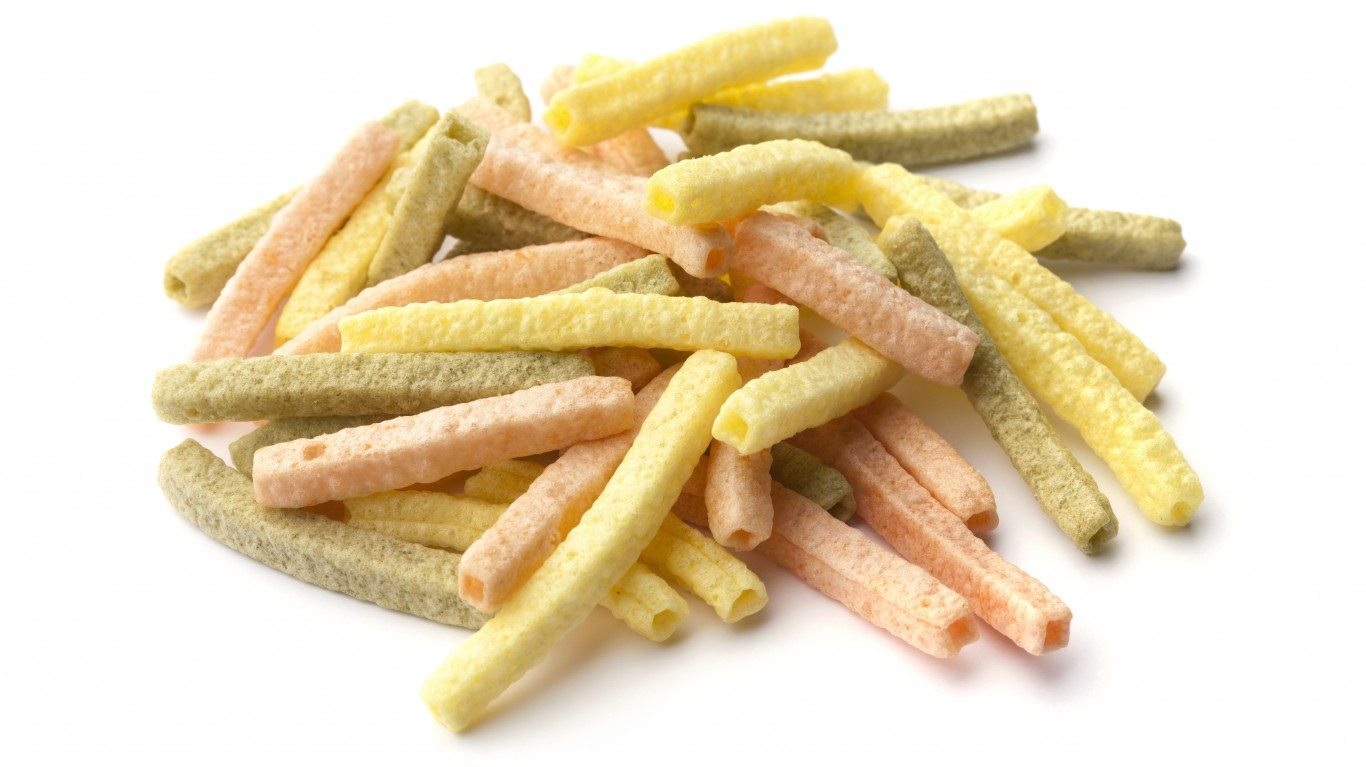
19. Veggie chips
“People think they are great because they see something that looks like vegetables,” Maycock said. “But they are cooked in oil and heavily processed.” The healthy ingredients have been lost in the process. As the label indicates, there are no actual vegetables in the chips, just vegetable powders, along with salt and one or more kinds of oil. Veggies chips contain slightly less the same amount of calories and fat as potato chips.
[in-text-ad-2]
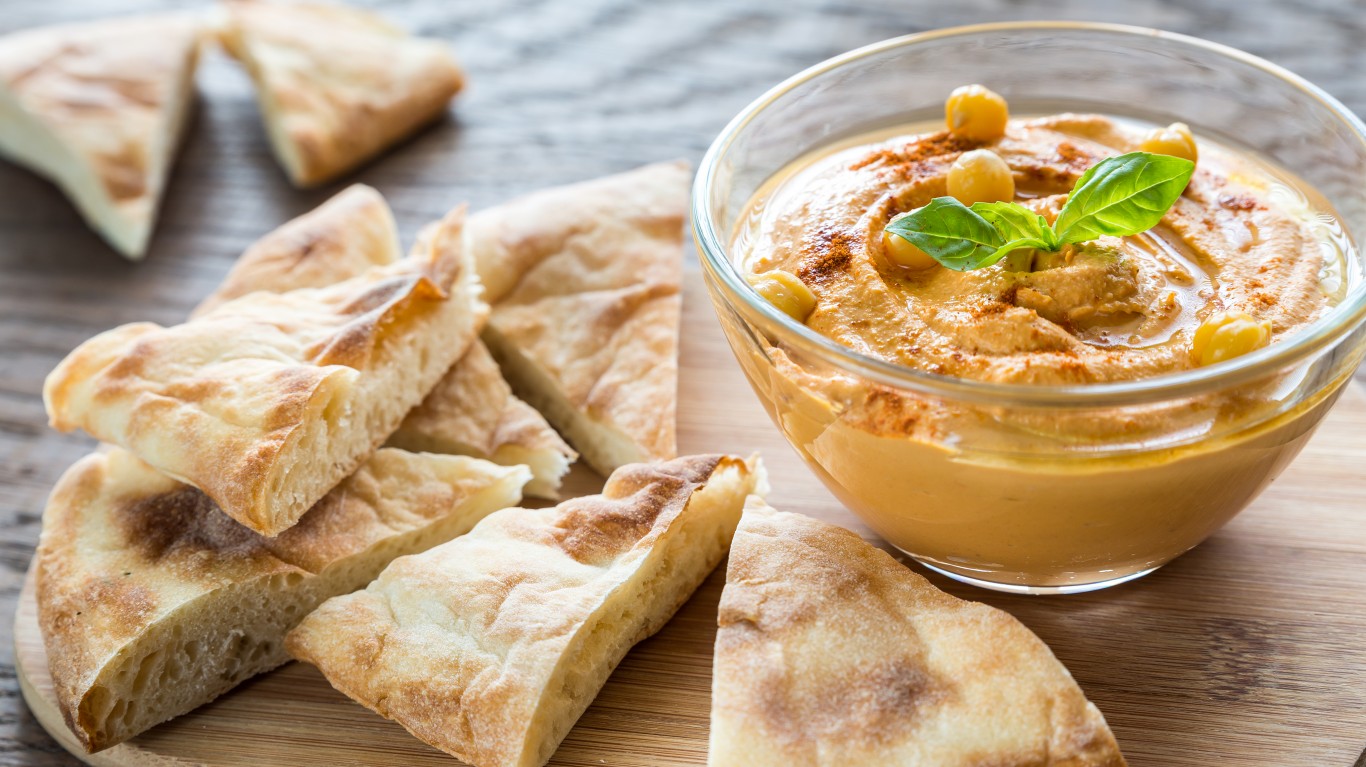
20. Hummus
Not all hummus is made equally, Maycock said. The kind that has just chickpeas and olive oil makes for a healthy dip, he noted. The problem is that many of the brands you find at stores didn’t use olive oil. They opted for canola oil or some other kind that is not as healthy, according to Maycock. Canola oil is generally considered safe and it contains high amounts of healthy fat, but there are some concerns that it turns rancid when exposed to heat in the production process, destroying the omega-3s, and possibly even creating trans fats. This is also what makes certain items in fast-food chains the absolute unhealthiest you can eat.
It’s Your Money, Your Future—Own It (sponsor)
Retirement can be daunting, but it doesn’t need to be.
Imagine having an expert in your corner to help you with your financial goals. Someone to help you determine if you’re ahead, behind, or right on track. With SmartAsset, that’s not just a dream—it’s reality. This free tool connects you with pre-screened financial advisors who work in your best interests. It’s quick, it’s easy, so take the leap today and start planning smarter!
Don’t waste another minute; get started right here and help your retirement dreams become a retirement reality.
Thank you for reading! Have some feedback for us?
Contact the 24/7 Wall St. editorial team.
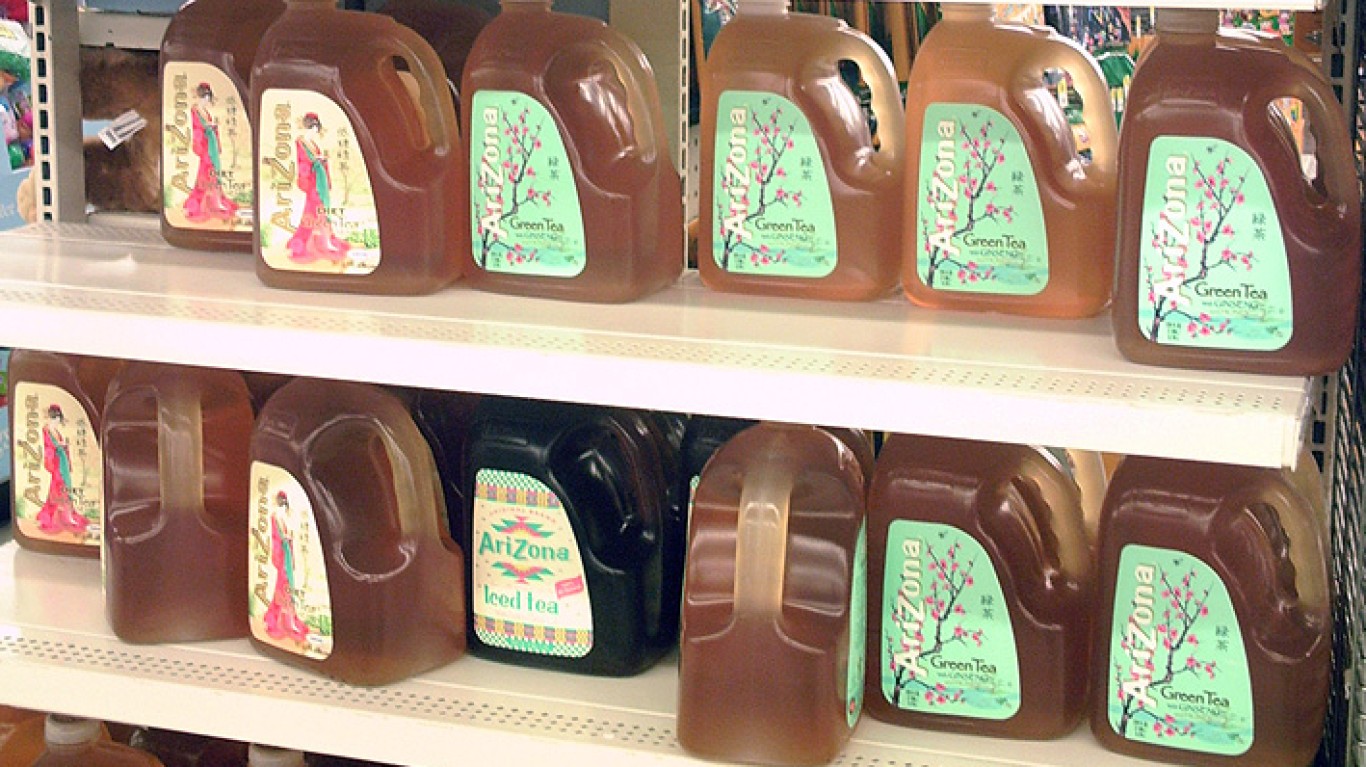
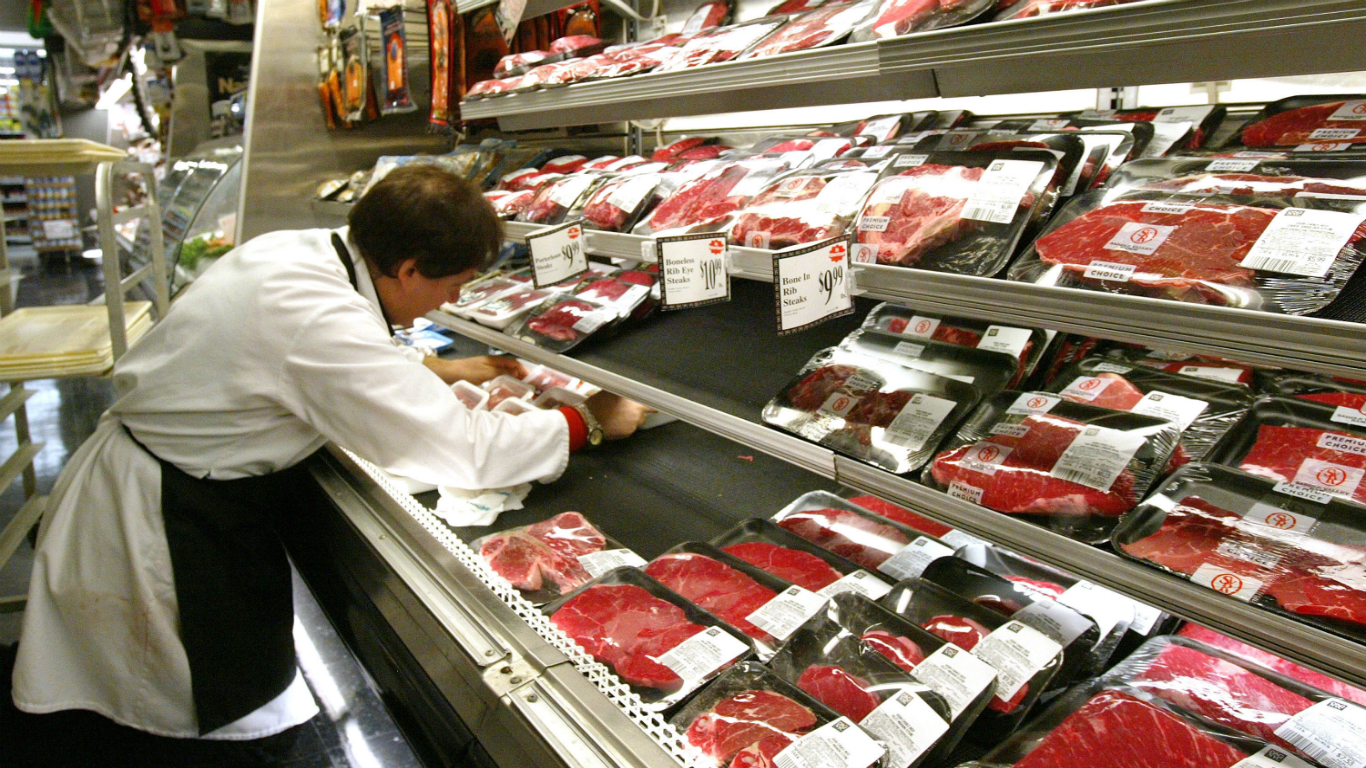 24/7 Wall St.
24/7 Wall St.